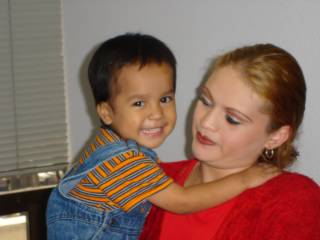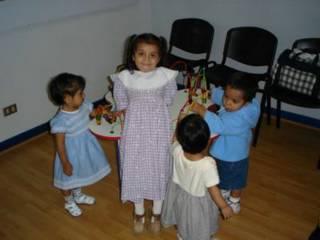On one of the large Guatemala adoption email lists, I've read stories in the past couple of days of parents adopting toddlers (rather than infants, which is much more often the case in that country) and there are some very difficult situations going on out there. This doesn't surprise me as I've read quite a bit of literature on the issues related to attachment in adoptions. Granted, attachment issues exist in biological relationships as well, but difficult or missing attachments are far more prevalent in adoptive relationships and that is what affects us, so that is what I'm concerned with.
We have to be prepared (or at least not be surprised) for Kevin to hate us - to kick and scream and cry because he is with us. I'm not suggesting that I know what's going to happen, but we should be prepared for the worst. Much of the screaming and fighting in this circumstance is from grief. This is clearly expected as the child is being pulled away from the people, smells, sights, and sounds that he is familiar with. In the pictures that we've seen of Kevin, he appears very happy and in love with his foster mother. I can bet that he'll be devastated to leave her.
Now consider a child who has had multiple caregivers in their short life. They may bond with the latest caregiver by learning to rely on that person for their needs - food, shelter, hugs, etc. It's possible, though, that the child will not actually attach to the caregiver on a deep level because the child has learned (unconsciously but realistically, nonetheless) that caregivers eventually leave. There is a much deeper sense of trust that is necessary for true, healthy, and complete attachment to occur. Often children in this situation will test the limits of the relationship. After a certain amount of time in a new home, the child will stop acting as if on a "honeymoon" and will act out to test the relationship. All previous caregivers have left, why won't this one? The adopted child may have an extended period of testing during which s/he has to learn to fully and completely trust the new parents not to leave.
Attachment isn't about a simple bond of knowing how to behave with someone in order to have needs met. Nor is it about what a child remembers on a conscious level from their first years of life - it's about the learned behaviors that can be ingrained in a person without the person having the capacity to realize what was learned.
I go back and forth between hoping that all will be perfect when we meet Kevin to being very worried at the possibility of him being distraught by our presence and his foster mother's absence. I can't begin to guess where on the spectrum Kevin's behavior will fall, but I do know that we will be up against forces we've not seen before. I expect that only other parents know how it is to see your child suffering in grief or to not be able to trust on a deep level. We'll be members of that group soon enough.




